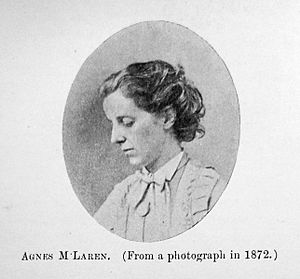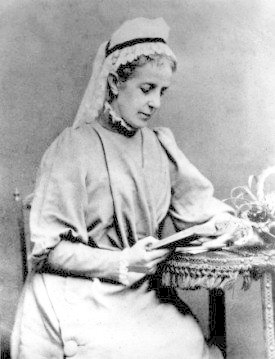Agnes McLaren facts for kids
Quick facts for kids
Agnes McLaren
FRCPI
|
|
|---|---|

McLaren in 1872
|
|
| Born | 1837 Edinburgh, Scotland
|
| Died | 1913 (aged 75–76) Antibes, France
|
| Education | Studied medicine University of Montpellier |
| Known for | medical work with women and children in India, and for women's suffrage activism |
| Awards | Fellow of the Royal College of Physicians of Ireland |
Agnes McLaren (born July 4, 1837 – died April 17, 1913) was an important Scottish doctor. She was one of the first to help women in India who couldn't see male doctors due to their customs.
Agnes also worked for social justice. She fought against unfair practices and supported women's rights. She signed a petition in 1866 asking for women to have the right to vote. She was also a secretary for the Edinburgh National Society for Women's Suffrage. She worked alongside her stepmother, Priscilla Bright McLaren. In 1873, she traveled with Priscilla to give talks about women's voting rights.
Agnes wanted to study medicine, but she couldn't graduate in Scotland. So, she went to France to study. Later, she became a member of the Royal College of Dublin. This allowed her to practice medicine back home. She also became a Catholic to do missionary work.
Contents
Early Life and Education
Agnes McLaren was born in Edinburgh, Scotland. Her father, Duncan McLaren, was a successful businessman and a well-known politician. Her mother died when Agnes was only three years old. Her father's third wife, Priscilla Bright McLaren, later worked with Agnes on important causes.
In 1876, Agnes began studying medicine at the University of Montpellier in France. She became one of the first ten women in Britain to graduate as a doctor. By 1882, she was also a Fellow of the Royal College of Physicians of Ireland. She had her own medical practice in Cannes, France. She would spend her summers in Edinburgh and winters in France.
Helping Women in India
In 1898, when she was 61, Agnes became a Roman Catholic. She then went to Rawalpindi, which is now in Pakistan, with a Catholic mission. She learned that many women in India needed medical help.
The Problem of Purdah
In India, a custom called purdah meant that women could not be seen by men outside their close family. This meant they couldn't get medical care from male doctors. In the early 1900s, there were very few women doctors. Because of this, thousands of women died each year during illness or childbirth. Many babies also died very young.
St. Catherine's Hospital
Agnes McLaren wanted to solve this problem. She started the Medical Mission Committee in London. This committee helped fund a small hospital called St. Catherine's Hospital in Rawalpindi. This area really needed medical help.
Changing Church Rules
Agnes looked for women who could help run the hospital. She found out that Catholic Church rules stopped nuns from giving this kind of medical care. She asked the Pope to change this rule.
While waiting for an answer, she looked for women interested in healthcare abroad. Anna Maria Dengel, from Austria, responded to Agnes's request. Agnes encouraged Anna to study medicine. Anna later started a new group called the Medical Mission Sisters. These are Catholic Sisters who are trained as doctors and nurses. They help women and children around the world.
In 1915, another doctor named Mary Glowrey was inspired by Agnes's life. Mary Glowrey also became a medical missionary in India. She received special permission from the Pope to work as both a doctor and a Religious Sister.
Agnes McLaren died in 1913 and was buried in Antibes, France. The British Medical Journal wrote that she was a woman with a strong spirit. She was known to many people who worked for good causes, from many different countries and beliefs.
See also
 In Spanish: Agnes McLaren para niños
In Spanish: Agnes McLaren para niños


